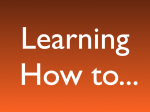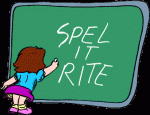|
|

•→Commenting-on-the-news/⇐[speaking]
•→http://www.englishpage.com/readingroom.html⇐
World news for students of English in three levels ⇑ Dead easy!
¤ Special English
A simple form of the English language, used by a public radio station called Voice of America, run by the United States government in Special English programs […]

•→ English greetings ←[introducing yourself & other people]
← There are many ways of bidding someone farewell →
Some are very specific;
others restricted to some territories.
¤ Vagueness in spoken English
Vague language […]

Learning strategies or study skills ⇑ determine the approach for achieving the learning objectives. The strategies are usually tied to your needs and interests to enhance learning and are based on many types of learning styles.
¤ Learning strategies ← ¤ Guessing meaning from context ←(A favourite strategy)
•→Better […]

• Speaking generally, there are two types of language learner:
The first type gets really worried about making errors or mistakes. They think about everything that they say carefully. Sometimes, if they start to say something, and then realise they have made a mistake, they will stop and correct that mistake, […]

•→www.thefictiondesk.com/ten-ways-to-improve-your-writing-for-free/⇐
¤ 6 ways to improve your English writing skills
Today it is very trendy to focus primarily on communicative skills and neglecting writing as a method of learning an English language. Though it is essential to make yourself understood in speech, writing is equally important in the […]

Auxiliary verbs are needed in English for both questions and negative statements. They are grammar words, and typically de-emphasized in speech by being uttered in a very soft voice. They often appear as question-tags in everyday conversation… «You know what I mean, don’t you?»
When we write in […]

•→Sounds of The Alphabet⇐
¤ English Spelling
Chaotic though it may seem, the English spelling system has its own rules, like most languages do. English borrowed thousands of words from all over the world, which is why there are so many exceptions.
Φ Spelling Rules →[01]← / →[02]←
•→ […]

In linguistics, one of many styles or varieties of language determined by such factors as social occasion, purpose, and audience. More generally, register is also used to indicate degrees of formality in language use.
Formal Style Informal Style Legal English Levels of Usage ¤ Formal & informal English: explanations & tips…
abril 15th, 2015 | Tags: tips, style, quiz | Category: FunctionaLang |

∴
Unlike Spaniards, who are prone to exaggeration in their everyday remarks, Britons (not Americans!) tend to prefer understatements. Take a movie: while it may well be appraised as ‘Great!’ or ‘Brilliant!‘ by a Spanish national, it might simply be assessed as ‘Not bad’ (not less appraisal to be inferred from the lips […]

♣ Can you feel the pain? ↔aches & pains. •→PAIN collocations⇐
•→Physically painful ⇐[MacMillan Dictionary]
¤ English words and phrases connected with injury.
Boil = infected swelling with liquid inside it:
«You’ll need to go to the doctor to have that boil lanced.» (lance – puncture and clean)
Lump […]

THE LIVING SISTERS ⇓ Video by Michel Gondry [2011]
How are you doing? How are you doing?I’ll be fine, how about you?I’m fine too
How is it going? How is it going?Yes it goes, what about you?It goes for me too.
Nothing new, can’t […]

¤ Past simple for past habits & states :
The past simple is used to express habits and states that existed during a period of time in the past. This period can be implied or expressed with a time expression or a clause:
When I was a child, I visited my grandma every […]

♣ Negation ⇐(like asking) is one of the most difficult areas of English
•→ Double Negatives⇐[a feature of Spaniards and Blacks]
∇ Transferred Negation
When we express negative ideas with verbs like think, believe… we prefer to make the first verb negative instead of the second. We shift or transfer the […]

• Asking questions is another tricky area of English language. This →Anglo-link video lesson ←may give you some insights.
⇓ Another video tutorial by Katie [Beta College of English]
◊→ Intonation in questions ⇓
•→ Question Tags – Intonation ←
•→ Follow-up Questions ⇐
[…]

¤ Ways of saying . . . ‘YEP!’ ⇓
. . . ‘definitely‘ / ‘of course‘ / ‘sure‘ / ‘naturally‘ / ‘that’s right‘ / ‘I don’t mind if I do‘ / ‘by all means‘ / ‘you bet‘ / ‘you’re on‘ / ‘no problem‘ / ‘affirmative‘ / ‘absolutely‘ […]

⇒ Telephone English ⇐
∴ Telephone Language
∴ Phoning a company: ⇒[01] ⇔ [02] ⇐
∴ Leaving a Message on an Answering Machine⇐
∴ Saying telephone numbers ⇐
∴ Spelling addresses ⇐
Φ Quizzes … ⇒[01] ⇔ [02] ⇔ [03] ⇐
marzo 8th, 2015 | Tags: tips, quiz | Category: FunctionaLang |

Auxiliary, or helping verbs, are used before infinitives to add a different meaning. The following auxiliaries are called ⇒Modal Auxiliaries or Modals⇐
Modal Auxiliaries Meanings / Functions can ability, permission, request, possibility could ability, formal request, possibility shall futurity, willingness, intention, suggestion, insistence should obligation, necessity, expectation, advisability will willingness, intention, prediction, […]

• Survival English for Travelers …⇒ [01] ⇔[02]⇐
· · · Common words and phrases
¤ QUIZZES ⇐… [definitions]
• AT THE AIRPORT: Looking for the check-in desk← • At the check-in desk: ⇒[01] ⇔ [02]⇐ →What’s wrong? Questions and answers←
marzo 4th, 2015 | Tags: quiz | Category: FunctionaLang |
|
|














